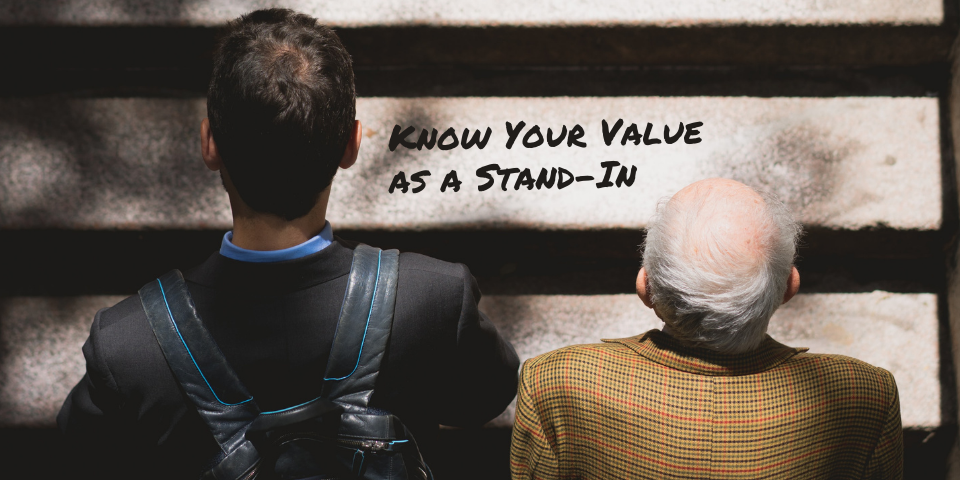On a TV or film set, stand-ins primarily serve the function of providing the crew with subjects to light and shoot before the main actors take their places.
In general, stand-ins are valuable to a production insofar as they can do those simple-seeming tasks.
Perhaps surprisingly, not all stand-ins can do those tasks — at least well.
And some stand-ins not only do these tasks exceptionally well, but they also do other things that productions value.
In order to stand out among stand-ins, it may help to ask yourself what value you provide a production? How do you solve a production’s many problems with your work as a stand-in?
Here is an incomplete list of ways you can add value as a stand-in. When you know your value, you may better understand why a casting director keeps calling you, a production company wants to keep you, and what to say about yourself to help you lock in your next stand-in job.
Be Alert to the Need for a Stand-In
Most stand-ins simply wait for a production to shout out “Second team!” Those stand-ins then scramble to set, sometimes already keeping production waiting.
Other stand-ins learn to anticipate when a production may want stand-ins. They get close to set when they have learned production tends to call for stand-ins.
Then, there are the rare stand-ins who don’t rely so much on being called or on past patterns. They almost have a “Spidey sense” of when a production may need a stand-in, or they keep open to irregular patterns when stand-ins may be needed. When these stand-ins are available to production without being called for, this can often be a pleasant surprise to productions that help them see the value of having them regularly on the job.
Of course, this can go too far. If you hang too close to set when production definitely wants fewer people there or wants to call for second team, hanging around closely to set is no real value but a nuisance. But finding that right balance can help elevate your value as a stand-in.
Be Attentive to All Actions in a Scene, Not Just Your Actors
Most stand-ins simply watch their actors in a scene. They may not have a really good sense of what the other actors did in the scene.
Then there are stand-ins who take in their actor’s actions in a scene, as well as the actions of the other actors. They might have a general sense of entrances and exits, but no real specific knowledge of other actors’ actions and timing.
Then, the rare stand-in keeps track of as much of the scene action as possible for all the actors, not just the stand-in’s. This is not simply during marking rehearsal, but also from take to take to take.
The rare stand-in who catches not only their actor’s blocking, but also changes to it and changes other actors do from take to take, can really help a production understand why certain marks should or should not be changed or where exactly a camera should be pointed.
Of course, knowing other actors’ blocking is the responsibility of other stand-ins. But at least knowing the other actors’ blocking can help solve any problems when unobservant stand-ins don’t know what their actors did in rehearsals or takes.
Be Helpful to New Stand-Ins
Many stand-ins may not socialize much when they are on a new set, out of being in new and uncomfortable surroundings or perhaps out of a lack of job knowledge. This is fairly normal.
Other regular stand-ins on the job may not reach out to this stand-in or introduce themselves. This happens a decent amount of the time.
Still other stand-ins will reach out and talk to new stand-ins on the job and help them with any questions they have. These stand-ins tend to add value to a production because they help prime new stand-ins for the job.
The rare stand-in will take the time to really help the new stand-in know the key information for doing the job on that particular set. And that rare stand-in will take the initiative to do so, rather than wait for a question from the new stand-in.
A stand-in like this adds value by taking such initiative because doing so helps to mitigate issues a novice or disoriented stand-in on set may cause. When a production knows a stand-in does this, they see added reason to keep a resourceful stand-in like this around.
Of course, if a production depends on you to do this (to the point it seems to expect it from you as part of your job, rather than as a service you volunteer), the dynamics are a bit different. But helping other stand-ins from your heart rather than out of production obligation tends to mean you add value to a production with your presence.
Be Reliable
Some stand-ins are unreliable in different ways. Some show up late. Some cannot be found when called. Some don’t do their job very well, or do so inconsistently. Some aren’t reliably available for a recurring stand-in job.
Many of these demonstrations frustrate a production, and if they happen a lot, a production has to deal with unneeded stress.
A stand-in who is reliable, available, and frequently willing to do stand-in work has added value, because a production can depend on such a stand-in and solve that hiring problem with the same, trustworthy person, rather than a revolving door of stand-ins. Basically, a reliable stand-in prevents production a lot of unnecessary stress.
Of course, this does not mean a reliable stand-in is never unavailable. Sometimes life things happen and even reliable stand-ins are unavailable. But with a strong foundation of reliability, a production will see value in the stand-in even despite the occasional lapse or unavailable day.
Have a Sense of Humor
While stand-in work can be serious and professional, many people on the crew have close relationships. If you are all business among a more relaxed crew, your conduct may be a bit abrasive, even if you are acting professionally.
Having a sense of humor about your work can add value to your stand-in work. The ability to laugh can show you have confidence and comfort on set. If you make a mistake and laugh rather than distress, you actually may be demonstrating to the production your humanity as a professional, rather than suggest inexperience as an amateur.
With that said, you often have a camera focused on you. If you hear something funny on set, you want make sure you’re focused on your job and your eyeline because you still may be being lit or observed. While making sure you keep a sense of humor, try to avoid inappropriate laughter or losing track of what your job is.
Do Keep It Professional
Overall, stand-ins add value when they know how to behave on set. They know the difference between right conduct and wrong conduct, and they have the ability to evaluate their own conduct and change it if it is wrong or not right.
These stand-ins know about sexual harassment and how such conduct can interfere with the comfort, safety, and job performance of other stand-ins or even others on the production. They don’t engage in conduct that could be construed as possible sexual harassment, and they take precautions to ensure more intimate contact they might have to engage in with other stand-ins (such as standing in in scenes with hugs, kisses, sex, or other intimate actions) is consensual, safe, and comfort to the best possible degree they can.
These stand-ins add value because they won’t cause a production trouble or fear on production days that contain sensitive matters — or even on everyday shoots.
Be Communicative
Sadly, all too often, stand-ins disappear when productions need them. Assistant directors and production assistants scramble to try to locate them. Sometimes they are simply in the bathroom, but not always.
A stand-in who communicates with key personnel when they need to step off set provides immense value to the production. They know exactly where to find you in case something suddenly changes on set and you are needed when you least expect it. That is a load off a production’s mind.
Of course, if you need to go to the restroom and you tell another stand-in, that may be okay in some situations. But when you tell, say, a 2nd 2nd AD you are “10-1,” you get the opportunity to communicate to the production that you care about their knowing where you are when you need to step out.
Can You Ask for More Money When You Know Your Value?
If you deliver a lot of value to a TV or film production when you work as a stand-in, it is natural to wonder if you can ask for a higher rate when you work. It is also natural to figure out that if you are paid the same as another stand-in who cannot do the job nearly as well as you, there is something weird to be paid the same.
If you know your value as a stand-in, you might challenge yourself to ask for a higher rate. See what happens. You might get no for an answer. Then again, you might get a yes.
Be prepared to know your value, back up your value with some of the reasons above or others you may have figured out, and know what rate you’d want to make you happier for the services you provide.
Perhaps be willing to settle for a counteroffer. If you do, you still will probably be working at a higher rate than even the best stand-ins.
What other ways do you believe stand-ins add value? Have you succeeded in getting a higher rate based on the value you provide production? Share your answers for others to read in the comments section below!







Leave A Comment